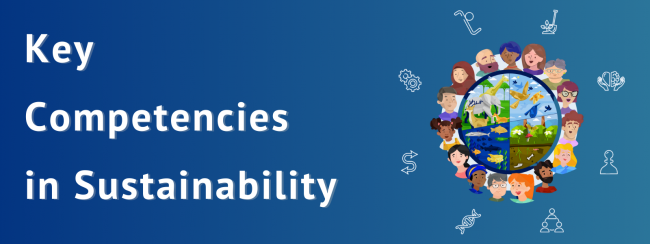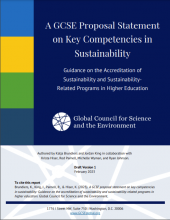Return to the Sustainability in Higher Education initiative page here.

GCSE and the Sustainability Education Community of Practice have undertaken several activities to demonstrate convergence around the key competencies in sustainability. These activities explored convergence: (1) across international initiatives, (2) across experts, and (3) across key stakeholders.
|
Convergence across international initiatives |
A series of international initiatives from different international contexts with different purposes, audiences, and levels of education were reviewed. This included efforts led by[MOU1] the United Nations Educational, Scientific and Cultural Organization, the European Commission’s Joint Research Center, the Australian Council of Environmental Deans and Directors, the Educating Future Change Agents Research Project, and the National Academies of Sciences, Engineering, and Medicine. The initiatives demonstrated convergence on: (1) what the key competencies are, (2) how they are necessarily interrelated, (3) their importance as a reference for learning objectives in the context of sustainability in higher education, (4) the key role of values-thinking competence, and (5) the efficacy of a diverse set of teaching and learning approaches to promote their development. |
|
Convergence across experts |
An expert-based, international Delphi Study was conducted (Brundiers et al. 2021)[MOU2] to examine perspectives on the key competencies. The study found agreement on the key competencies outlined in the framework outlined by Wiek and colleagues (Wiek et al. 2011). In addition, the study (1) refined the definitions of the competencies and their operationalization at different levels, building on Wiek et al. 2016, (2) suggested two additional competencies: implementation competency and intrapersonal competency/mindset, and (3) specified additional learning objectives for students interested in a career as a sustainability researcher beyond previous descriptions of objectives for sustainability professionals in general. Importantly, it (4) identified values-thinking competency as a lead-competency used to orient both learning and problem-solving related to sustainability. |
|
Convergence across key stakeholders |
Since August 2022, a series of presentations, meetings, interviews, and workshops have been hosted by GCSE to engage with partners and stakeholders to receive feedback on the proposed reference framework for key competencies in sustainability as synthesized through literature and expert reviews by Wiek et al. 2011, Brundiers et al. 2021, and Redman & Wiek, 2021. This included consultation with the following organizations: Association for the Advancement of Sustainability in Higher Education, Association for Environmental Studies and Sciences, the Australian Council of Environmental Deans and Directors, the Cloud Institute, the North American Association for Environmental Education and the Sustainability Curriculum Consortium. After publication of the Proposal Statement on Key Competencies in Sustainability, an research-based input process was conducted with interested stakeholders to collect feedback via a survey and interviews, in order to further refine and validate the proposed reference framework. Overall, dialogue with key stakeholders indicated agreement on the interrelated set of key competencies in sustainability and support for a convergence statement to inform the design and practices of sustainability programs in higher education. |
The graphic below demonstrates the use of all key competencies working in concert in the process of analyzing and solving sustainability problems, with values thinking (yellow) taking a lead role (Wiek et al 2011 & 2016).
Proposal Statement on Key Competencies in Sustainability
 An updated Statement on Key Competencies in Sustainability was released on February 21, 2023 as part of a research project exploring use of the key competencies in higher education. View the proposal statement and input process here.
An updated Statement on Key Competencies in Sustainability was released on February 21, 2023 as part of a research project exploring use of the key competencies in higher education. View the proposal statement and input process here.
The input period for the Key Competencies Proposal Statement is now closed. We are synthesizing the input we received in the extended peer review process. Check back in Spring 2024 for the Convergence Statement on this shared reference framework.
View the Key Competencies proposal statement
Learn more about the Sustainability in Higher Education initiative here.


